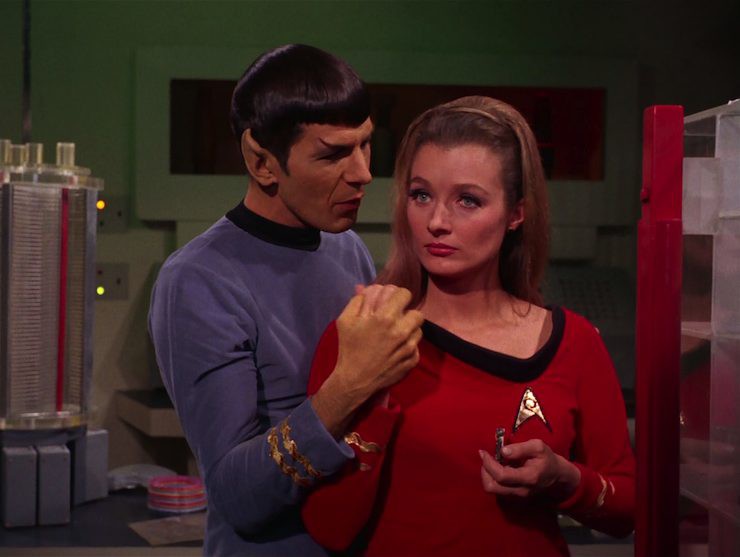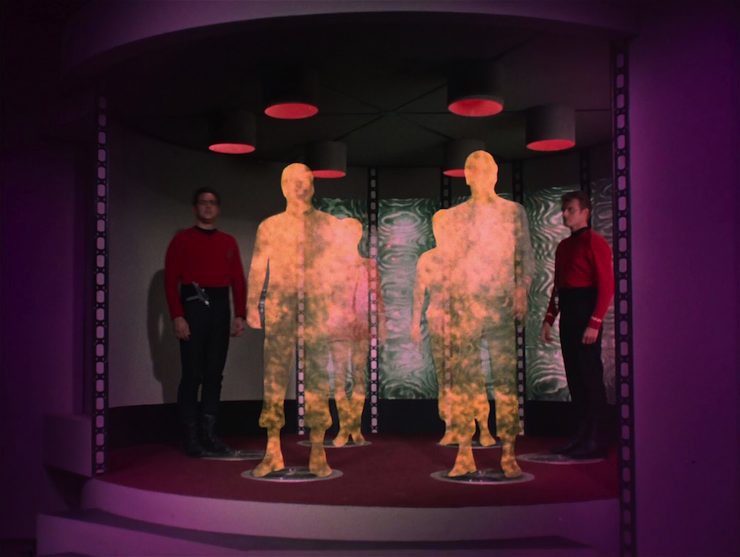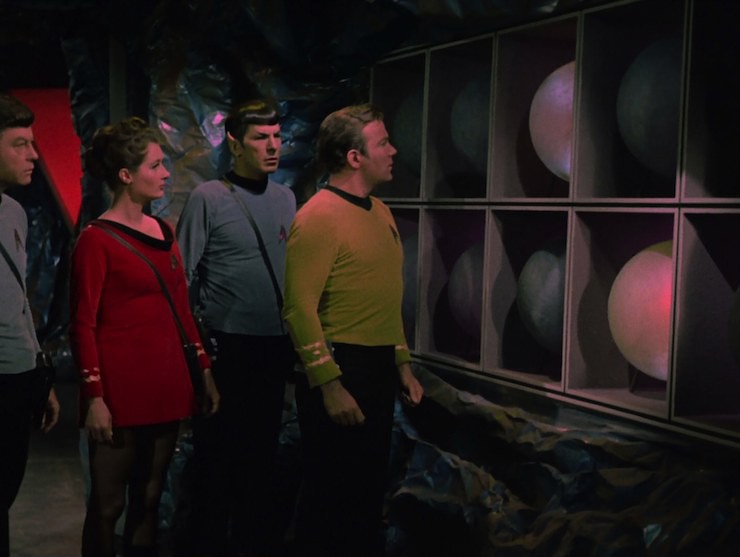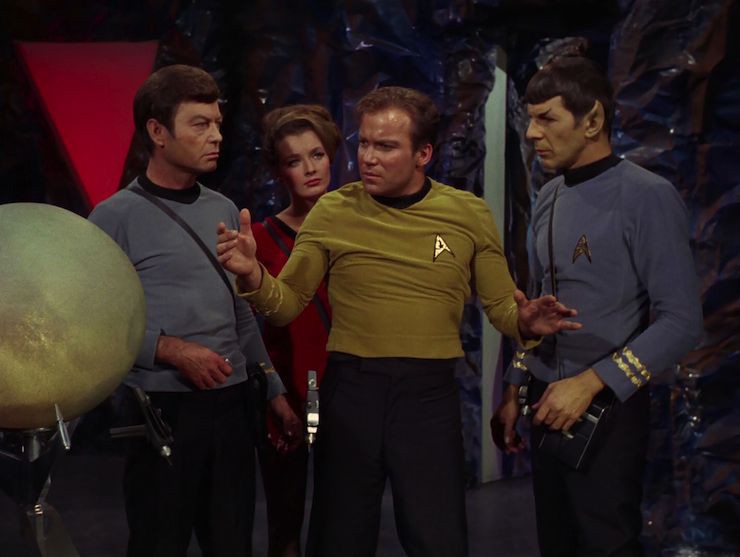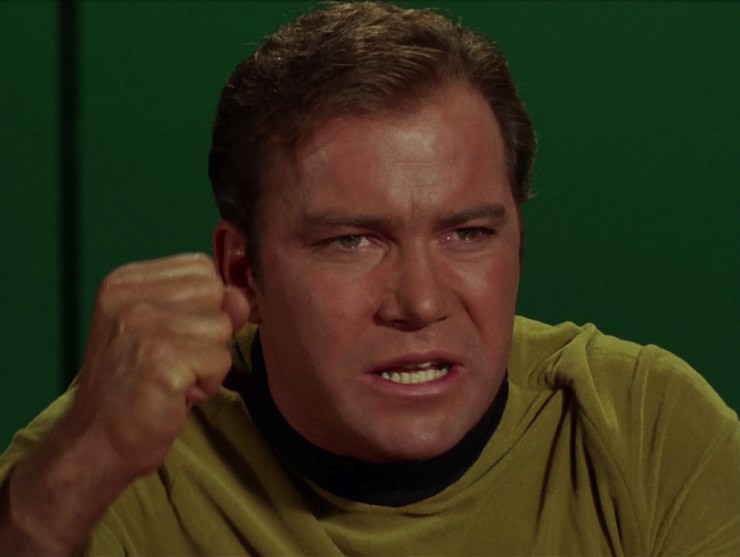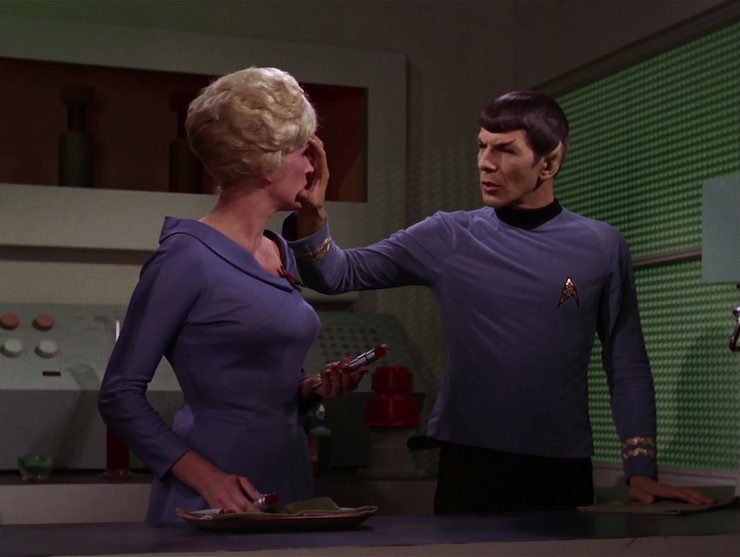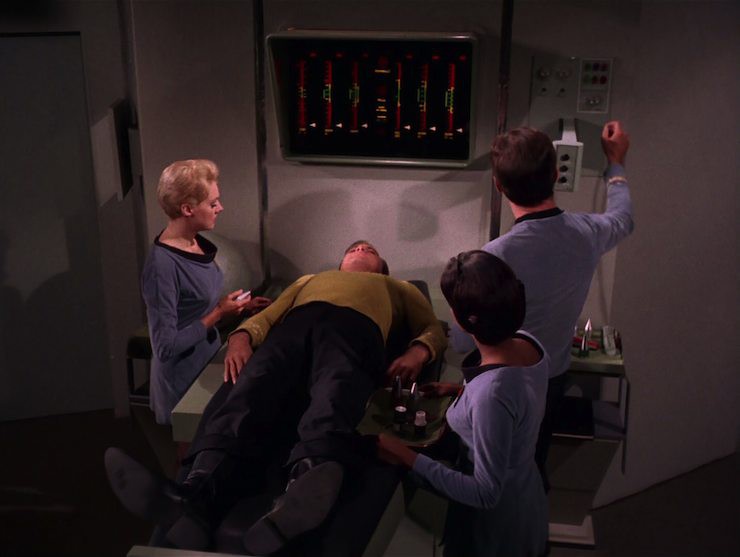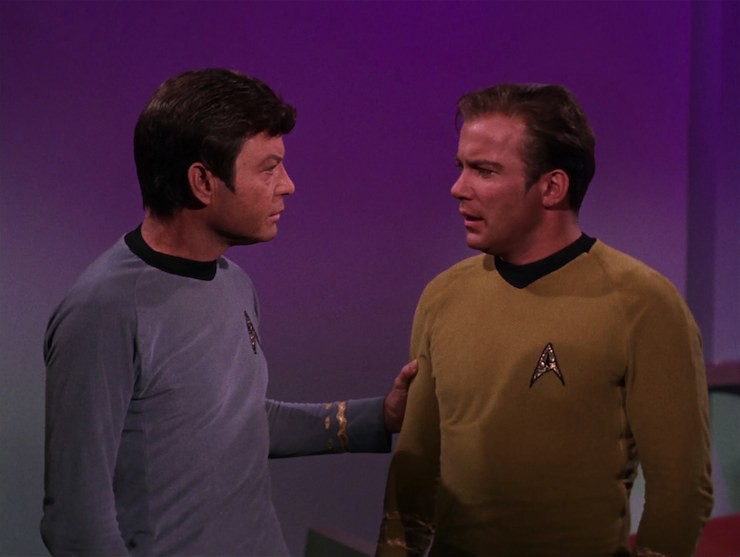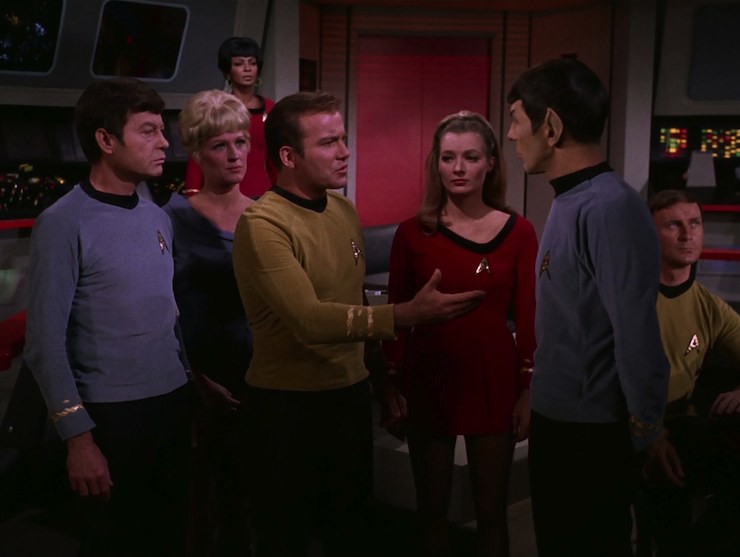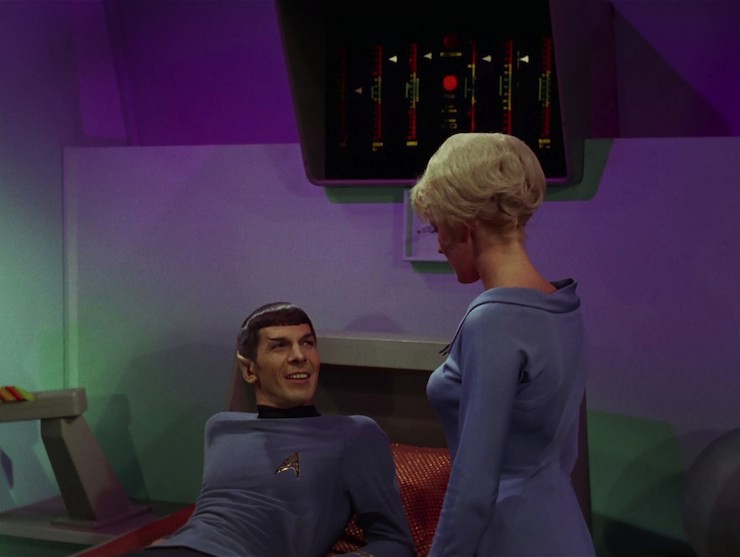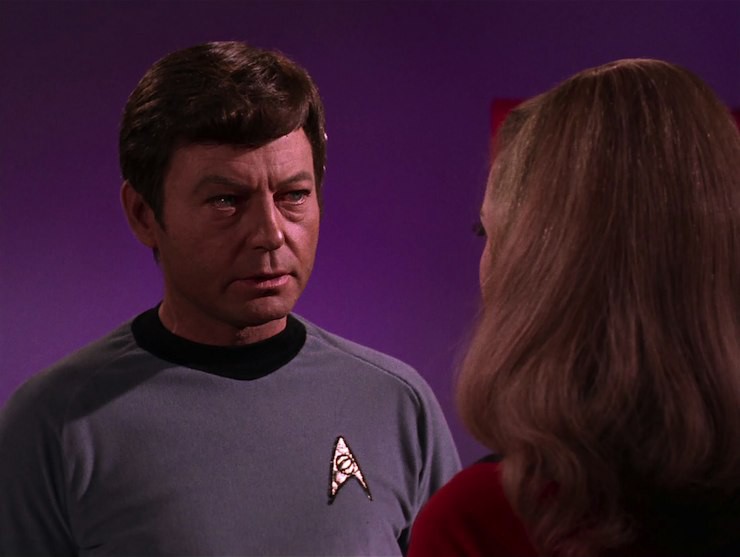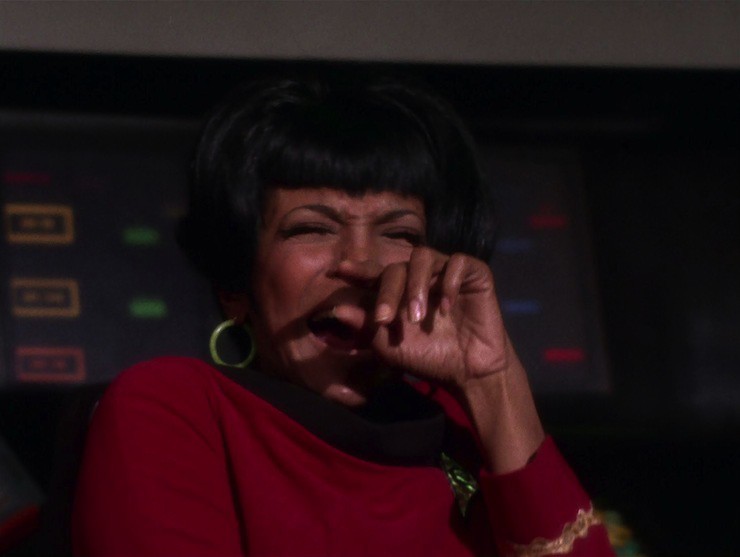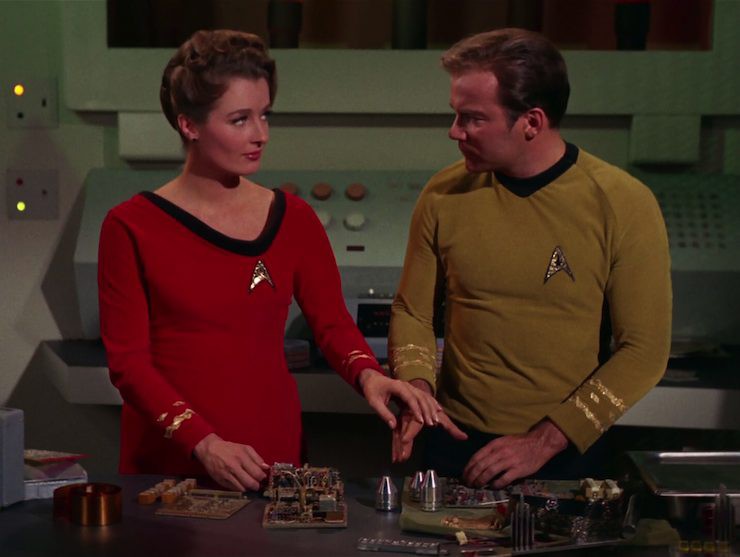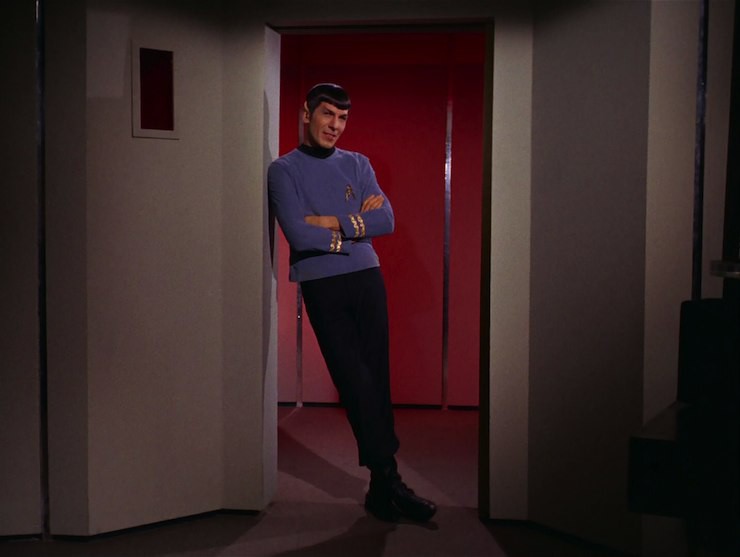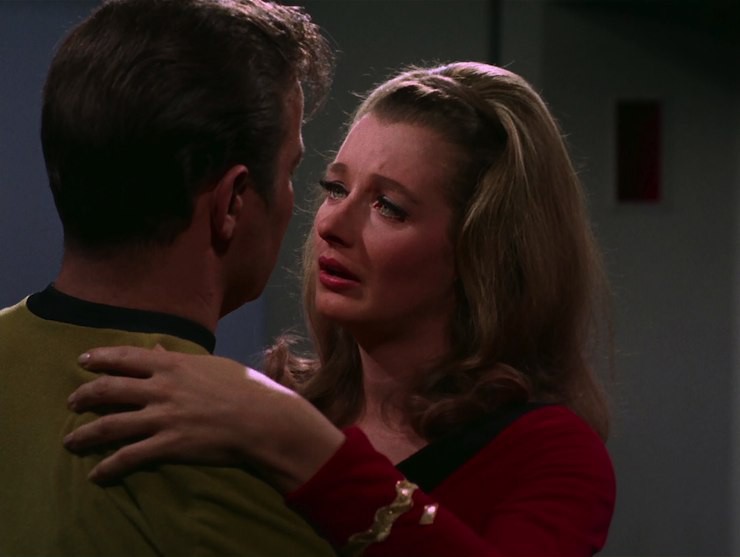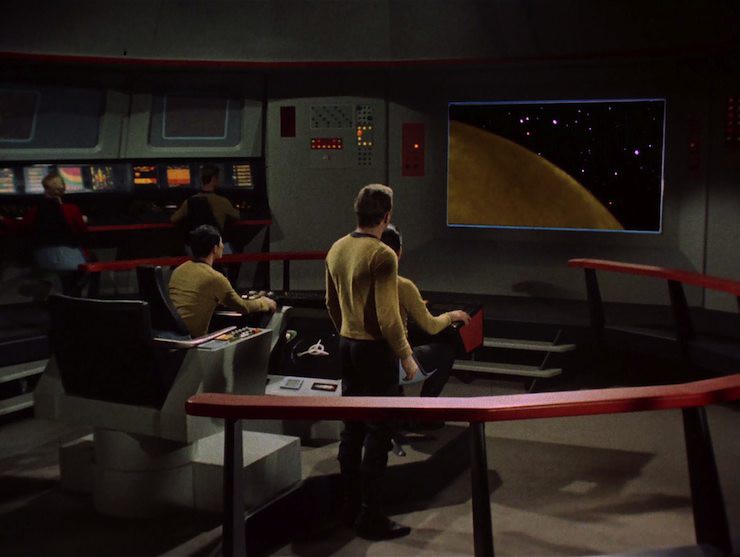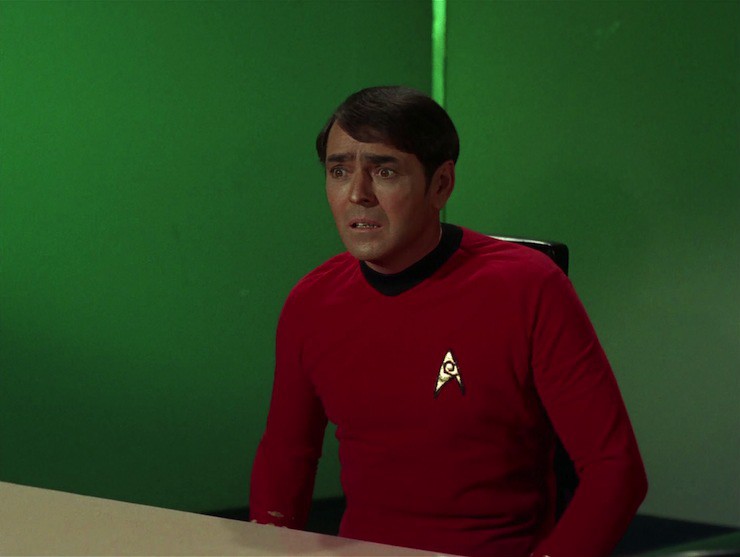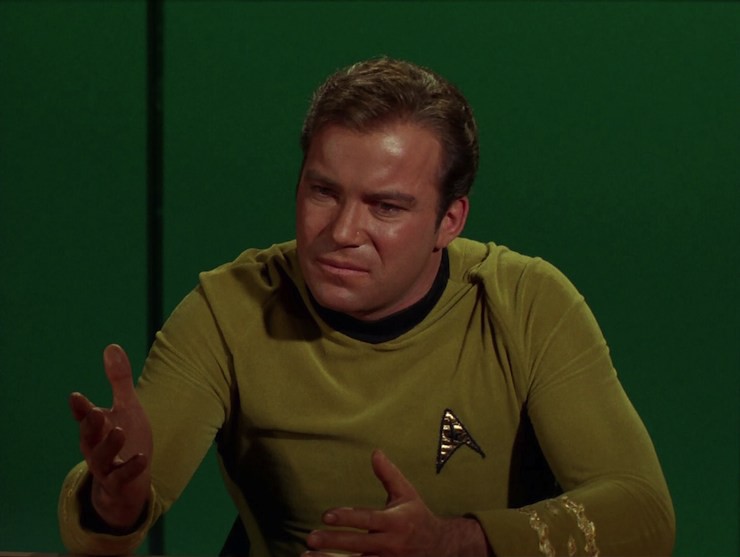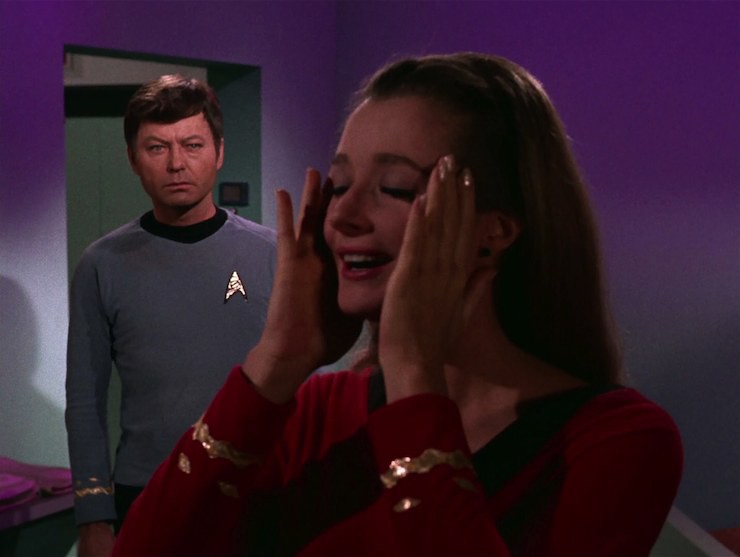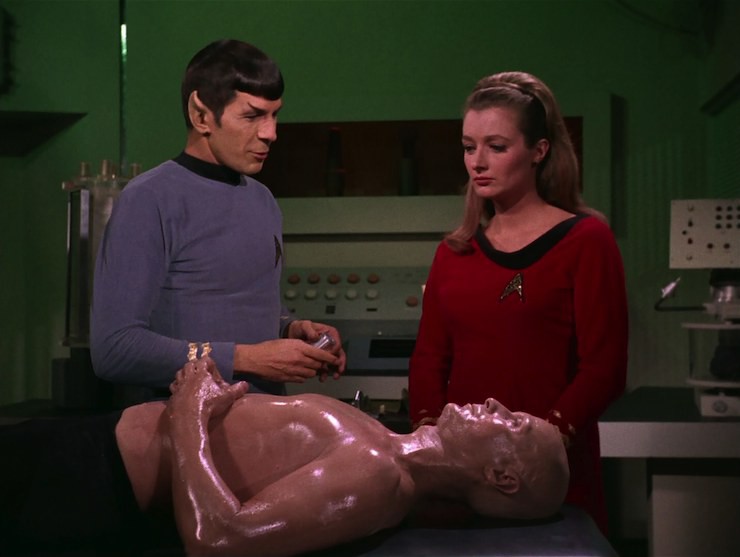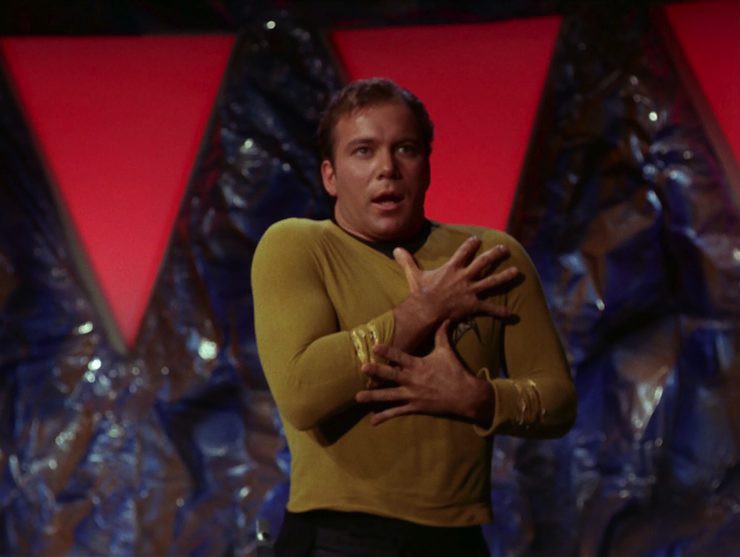“Return to Tomorrow”
Written by John Kingsbridge
Directed by Ralph Senensky
Season 2, Episode 22
Production episode 60351
Original air date: February 9, 1968
Stardate: 4768.3
Captain’s log. The Enterprise has picked up some kind of reading. Sulu has traced it to a planet and they head there, with Spock reporting that it used to be Class-M until the atmosphere was ripped away in a cataclysm. When they achieve orbit, the disembodied voice of Sargon is heard by everyone—he directed the ship to the planet with his thoughts, and is now speaking to everyone telepathically. He also says that he’s as dead as the planet, and he wants Kirk to rescue him from oblivion. Spock does detect energy readings deep beneath the surface, inside a chamber that is suitable for humanoid life support. Kirk beams down along with Spock, McCoy, and Dr. Anne Mulhall of astrosciences. Kirk doesn’t intend initially to take Spock or Mulhall, but Sargon makes it clear that he wants them both there. He also operates the transporter himself, and refuses to transport the two security guards.
Spock reports that the chamber was constructed around the same time the atmosphere was ripped away. The landing party is greeted by what looks like a giant glowing ping-pong ball—it’s a receptacle that contains Sargon’s essence. His people colonized the galaxy long ago, and later faced an ultimate crisis that wiped out the entire planet—their minds became so powerful they thought they were gods. Only a few survived as energy beings.
Sargon possesses Kirk, and he’s overwhelmed by the physical sensations that he hasn’t felt in half a million years. McCoy is not thrilled with this, especially since Kirk’s heart rate and body temperature are spiking. Kirk’s own mind is in Sargon’s receptacle, but his mind doesn’t have sufficient energy to communicate.
Sargon brings the landing party to another chamber, which has ten more receptacles—the eleven strongest minds were preserved even as the planet was destroyed. But after half a million years, only three survive—besides Sargon, there’s Thalassa (Sargon’s wife) and Henoch (who was on the other side). The plan is for the three of them to borrow Kirk’s, Mulhall’s, and Spock’s bodies temporarily to construct mechanical bodies to transfer their consciousnesses into. They can’t just give instructions to Enterprise engineers, their methods are far too sophisticated.
Kirk’s body is being overworked by Sargon’s possession, and so Sargon exchanges again. Kirk briefly touched minds with him, so he knows the plan, too. Sargon allows them to discuss it—and if they refuse, Sargon will allow them to leave if they wish.
Spock and Mulhall are cool with it, as is Kirk, but McCoy and Scotty are reluctant—McCoy is particularly dubious about the fact that they want the captain and second-in-command to be possessed. And McCoy also wants to know why Kirk wants to do this.
Kirk gives a lengthy and passionate speech, insisting that he won’t order everyone to go along with it, even though he could, but he also believes that the potential rewards are as great as the risks—and that risk is their business.
McCoy and Scotty are moved by the speech and agree to go along. Scotty beams the three receptacles up and the minds of the three survivors are transferred. McCoy tasks Chapel with keeping an eye on their metabolic rate.
Henoch is thrilled to see a hot chick (Chapel) upon awakening, while Sargon and Thalassa are even more thrilled to be able to touch each other again. Both Kirk’s and Mulhall’s bodies are having trouble adjusting to the higher metabolism, but Spock’s body is more accustomed to it. Sargon asks Henoch to synthesize a metabolic reducer, which he does, with Chapel’s help. Henoch creates three hypos, one each for Sargon, Thalassa, and Henoch, but Sargon’s is different—which Chapel notices, but Henoch uses telepathy to brainwash Chapel. He wishes to keep Spock’s body, so Sargon (and Kirk) must die.
Sargon, Thalassa, and Henoch get to work constructing the mechanical bodies, though the former two are distracted by nostalgia for when they were alive and corporeal. Chapel is also acting a bit weird, as Henoch’s brainwashing isn’t as perfect as it might be.
But Henoch’s also working on Thalassa, trying to convince her that they should keep the bodies they’re in, which can actually feel, as opposed to the mechanical unfeeling ones they’re constructing. Thalassa goes to Sargon—only to find that he’s feeling ill. She tries to convince Sargon of what Henoch said, insisting that their minds in robot bodies can’t have mad passionate nookie-nookie—but then Sargon collapses. McCoy and Chapel arrive and he declares Kirk to be dead.
McCoy brings Kirk’s body to sickbay and is able to revive the bodily functions, but they have no means of transferring Kirk’s consciousness out of Sargon’s receptacle.
Henoch finishes Thalassa’s robot body, but she refuses to put her mind there. She goes to McCoy and offers to save Kirk in exchange for letting Thalassa keep Mulhall’s body. McCoy makes it clear that he will not peddle flesh. Angry, Thalassa starts torturing McCoy—and then she realizes what she’s doing and stops. And only then does Sargon’s voice sound in the sickbay. Sargon has placed himself inside the ship itself. He enacts a plan with Thalassa and Chapel, kicking McCoy out of sickbay. When he finally is let back in, Kirk is alive and well, and Mulhall is back in her own body as well. Sargon and Thalassa are now both together inside the ship, and the three receptacles have been destroyed. McCoy is devastated, as Spock’s consciousness was in one of them, but Kirk’s only reply is to have McCoy prepare the deadliest Vulcan poison he can concoct.
They arrive on the bridge—where Henoch is torturing Uhura and threatening to do the same to Sulu. McCoy tries to inject Spock, but Henoch stops him. He orders Chapel to give the poison to McCoy—but she sticks it in Spock’s arm instead.
Spock collapses, and Henoch abandons Spock’s body, fading into oblivion. But Sargon fooled McCoy into thinking he’d made a poison when, in fact, he just made something that would render a Vulcan unconscious. But Henoch believed it would kill him, because he read it in McCoy’s thoughts, so he fled. Spock’s consciousness, meanwhile, was in Chapel, which is how she was able to resist Henoch’s mind control, and is transferred back to Spock’s body.
Kirk and Mulhall give Sargon and Thalassa one last smooch before they fade into oblivion together.
Can’t we just reverse the polarity? Scotty is dismissive of the robot bodies, insisting that there be gears and pulleys—which honestly sounds hilariously primitive now, much less by the standards of the billions-of-years-advanced aliens…
Fascinating. Leonard Nimoy gets to laugh and smile and giggle and sneer and just generally be as not-Spock as it’s possible to be while Henoch possesses him.
I’m a doctor not an escalator. McCoy is against the plan from jump because of the physical consequences to the crew’s bodies as well as the other attendant risks, and his refusal to go along with Thalassa’s rather awful plan is a crowning moment of awesome matched only by his standing up to Khan.
Ahead warp one, aye. Sulu’s back! George Takei finally finished filming The Green Berets and is back to piloting the ship, though he really only gets two scenes.
Hailing frequencies open. Uhura gets to scream rather loudly when Henoch tortures her for defiance, and it’s a scream that makes it clear how much pain she’s in. (Honestly, Nichelle Nichols does a lot better than William Shatner or Diana Muldaur, who mostly just look like they have indigestion when Henoch goes after them a few minutes later.)
I cannot change the laws of physics! Scotty gets to play skeptic for the whole episode—he’s dubious about transporting through so much solid rock to get to the underground chamber, he’s dubious about the plan, he’s dubious about the robot bodies.
Go put on a red shirt. Two security guards are supposed to beam down with the landing party, but Sargon doesn’t transport them. I guess he didn’t need any dead bodies…
No sex, please, we’re Starfleet. Sargon and Thalassa are all over each other as soon as they’re corporeal again. Meanwhile, Chapel gets her long-standing wish of having Spock inside her. (Cough.)
Channel open. “I’m surprised the Vulcans never conquered your race.”
“Vulcans worship peace above all, Henoch.”
“Of course, Doctor, as do we.”
Henoch grooving on his awesome new bod, McCoy schooling him in Vulcan history, and Henoch providing a totally unconvincing rejoinder.
Welcome aboard. We’ve got the first of three Trek roles for Diana Muldaur as Mulhall (and as Thalassa possessing Mulhall). Muldaur will return in the third season’s “Is There in Truth No Beauty?” as Miranda Jones, and in the second season of TNG as Katherine Pulaski. (Amusingly, all three of Muldaur’s Trek roles are characters with doctorates.)
Plus, we’ve got both William Shatner and James Doohan doubling as Sargon, the former while possessing Kirk, the latter as Sargon’s disembodied voice, Leonard Nimoy doubling as Henoch possessing Spock, and other recurring regulars George Takei, Nichelle Nichols, and Majel Barrett.
Trivial matters: The episode received an uncredited rewrite by Gene Roddenberry, which led John Dugan to use the “John Kingsbridge” pseudonym. The specific rewrite that led to the pseudonym was the change to the ending, that Sargon and Thalassa were consigned to oblivion. A devout Catholic, Dugan wanted the pair of them to continue floating disembodied together in the universe, and he felt strongly enough about it to remove his real name from the script.
The script provides the very unsubtle name of the planet as “Arret,” which is “Terra” (an alternate name for Earth) spelled backwards. The name is never spoken aloud.
The 45th issue of DC’s first monthly Star Trek comic established that the supercomputer Vaal from “The Apple” was actually built by Sargon’s people. Sargon’s people were also referenced in Greg Cox’s The Q-Continuum trilogy and Christopher L. Bennett’s Department of Temporal Investigations novel Watching the Clock.
Kirk mentions the “first Apollo mission” that went to the moon, which accurately predicted that eventually NASA’s Apollo program would be successful and reach the moon, though it was not the first, but rather the eleventh Apollo mission that would do so a year and a half after this episode aired.
Your humble rewatcher taught a writing workshop for tie-in writing in 2004. One of the exercises I had the class do was to take the famous “risk is our business” speech Kirk delivers in the briefing room and rewrite it for one of the other Trek captains. It was meant as an exercise in doing different character voices.
To boldly go. “Risk is our business!” I always loved this episode as a kid, and I still enjoy it as an adult, though I can see its flaws much more so now.
As a kid I enjoyed the fun of watching Shatner and Nimoy play different people, I enjoyed watching McCoy stand up for his friends (“I will not peddle flesh” remains one of McCoy’s four or five best moments), and I enjoyed the whole concept of the minds in giant ping-pong balls.
As an adult, I see a lot more. The first two things I listed are still the main appeal here. DeForest Kelley is magnificent here, and his skepticism is well stated, sensible, and, as we see, totally justified. (Having said that, you also buy that he was moved by Kirk’s speech.) Shatner is far more focused and stentorian as Sargon, which makes the histrionics of the “risk is our business” speech that much more annoying. It’s in that speech in particular that Shatner’s reputation for overacting really started to grow its roots. Meanwhile, Nimoy is delightfully evil as Henoch, though the downside of that is that there’s no real surprise that Henoch turns out to be a bastard. That’s due in part to the episode running out of time for it. So much time is spent in the early going on drawn-out mystery and pointless misdirection (Sargon declaring that they must have their bodies in order to make the commercial break more dramatic, with him not explaining that they’re just borrowing until after the ads are done), that they have to rush through the actual plot.
Another problem is that they felt the need to drag in a woman we’ve never seen before to be the receptacle for Thalassa for no good reason, though there were plenty of bad ones. Honestly, this should have been a vehicle for Uhura, as the most prominent woman in the cast, but I’m sure that NBC would have had a conniption at the notion of an interracial kiss, something they would eventually try the next season, and that only got through barely and because Uhura and Kirk were forced to kiss (we’ll get into that in more depth when we slog through “Plato’s Stepchildren”). Here, Sargon and Thalassa going all kissy-face was necessary to the plot—so let’s cast a white woman we’ve never seen before! (To the script’s credit, Mulhall’s obscurity was used as a plot point when Thalassa tries to talk McCoy into letting her keep Mulhall’s body.) But Muldaur doesn’t really have enough time to make Mulhall into a person, and she doesn’t do enough to distinguish Mulhall from Thalassa, which takes the wind out of the sails of the plot.
I hadn’t realized how many times second-season Trek dipped into the well of aliens achieving human form and being overwhelmed by the sensory impressions, but unlike in “Catspaw” and “By Any Other Name,” it works well here, because Sargon, Thalassa, and Henoch have had humanoid forms in the past, but have been denied those feelings for half a million years, so of course it would be overwhelming, and lead both Henoch and Thalassa down the garden path of murder.
It also feels like far too many options were never brought up or explored. What about cloned bodies? Heck, how come these all-powerful super-scientific beings couldn’t manage to make a robot body that could feel? Why destroy the receptacles? (Besides, there were eight more intact ones down on the planet…) If they’re so telepathically powerful, why didn’t Henoch just take over from jump? And if Sargon was so much more powerful than Henoch that the latter had to be subtle, how did Sargon not know (after hanging out with his disembodied self for half a million years) that Henoch would betray them? I mean, I figured it out after he said all of three sentences…
Still, this is fun as an acting exercise for Shatner and Nimoy and for McCoy’s general awesomeness.
Warp factor rating: 6
Next week: “Patterns of Force”
Keith R.A. DeCandido feels real loose like a long-necked goose.










